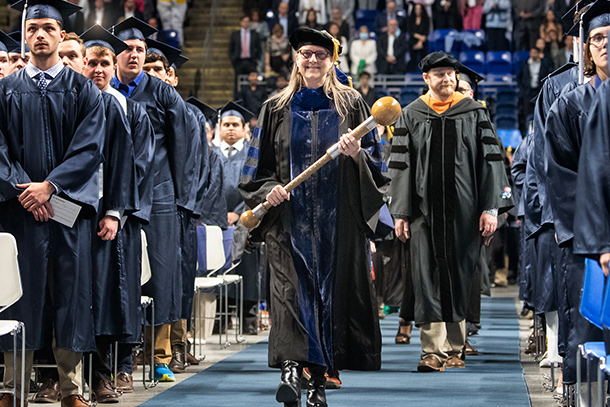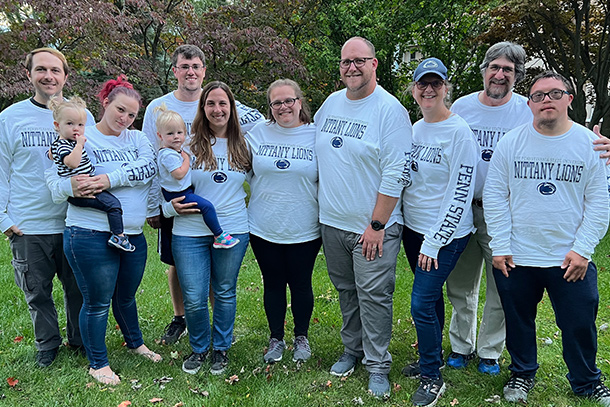
Christine Masters, assistant dean for academic support and global programs, has announced her upcoming retirement effective June 30. Credit: Patrick Mansell/Penn State.
Assistant dean in College of Engineering retiring after nearly 30 years of service
Jun 9, 2025
By Ty Tkacik
UNIVERSITY PARK, Pa. — Christine Masters, assistant dean for academic support and global programs and teaching professor of engineering science and mechanics (ESM), will retire effective June 30 after nearly 30 years as a faculty member in the College of Engineering.
“I’ve had the pleasure of working alongside Christine since I joined Penn State, and have been consistently impressed by the impact she has had both in the classroom and as a faculty leader,” said Vincent Meunier, P.B. Breneman Chair and Professor and head of the Department of Engineering Science and Mechanics. “Her dedication and contributions to the ESM program cannot be understated, and her wisdom and kindness will be dearly missed by the faculty and students at Penn State. I wish her the best and hope she continues to positively impact all those around her during her retirement.”
A Penn State alumna and the first person in her immediate family to attend college, Masters grew up in Saegertown, a small town in northwest Pennsylvania, before attending Penn State Behrend. As a third-year student, she transitioned to the University Park campus to finish her bachelor’s degree in mechanical engineering.
“I initially didn’t have interest in going to a big school, but having a group of friends that changed campuses with me to study engineering really helped,” Masters said. “You can make a big campus feel a lot smaller, just by doing things like sitting toward the front of classes and getting involved in clubs and extracurriculars.”
Masters only intended to pursue a bachelor's degree, working multiple jobs to pay for her undergraduate education, until she learned of the various engineering fellowships, assistantships and scholarships at Penn State. Masters received the Academic Computing Fellowship at Penn State — an initiative that supported grad students who wanted to apply computing to their field — allowing her to pursue a doctorate in ESM.
She met her husband, Robert Masters, when they were both undergraduate engineering students at Behrend. They got married in 1987, just after earning their bachelor’s degrees, and decided to become parents during graduate school while Masters was working on her doctorate in ESM and her husband was working on his master’s degree in mechanical engineering. She reflected how the couple would plan their course schedules opposite of one another, with one pushing their son in a stroller through the halls of the Hammond building while the other was in class. Just prior to obtaining her doctorate 1992, she started teaching mechanics classes for the ESM department.
“As I was finishing my dissertation, I went to the department and asked if I could try teaching because I knew many doctoral students taught at a college level, and I didn’t have experience doing that,” Masters said. “I absolutely loved it. I knew whatever I went on to do professionally from that point was going to involve teaching.”
While teaching, she began advising undergraduate students. At one point, Masters was simultaneously coordinating a team of teaching assistants, instructing about 600 engineering mechanics students and serving as an academic adviser for engineering science students. She was asked to serve as the interim engineering science undergraduate program coordinator during a colleague’s sabbatical. Her advising was so instrumental that she was asked to continue leading the engineering science undergraduate program, even after her colleague returned.
“I wasn’t specifically seeking to advance my career, I took on these things because I cared about them; I didn’t know I was building a resume for a future administrative role,” Masters reflected. “I just love helping students find pathways toward their future and feeding their passions.”
For nearly 12 years as assistant dean for academic support and global programs, Masters focused on developing support for academic advising in the College of Engineering. When she started in the role, there were only four professional advisers serving more than 3,500 first- and second-year College of Engineering undergraduate students at University Park and no professional advisers for upper-level students. She identified investment in advising supports as a critical need for the college.
Today, under Masters’ leadership, the professional advising community has nearly quadrupled. The team of professional advisers focused on supporting first- and second-year students is significantly larger, and half of the college’s academic departments now offer professional advising supports, creating what Masters called a “professional community of advisers,” that connect and collaborate with each other. In addition to advising, Masters has also significantly expanded support to identify and create global experiences for undergraduate engineering students and has contributed to improvements in the College of Engineering and the University academic integrity systems.
Masters said the mentorship from her professors, colleagues and particularly her predecessor in the assistant dean role, Jean Landa Pytel, helped her build her career. She is proud of the culture of collaboration and passion she has instilled in her team.
“I am going to miss the people on the student support team the most,” Masters said. “I have spent the last 11 years building this team — I care so deeply about them and their connection to each other. I hope they continue to tear down barriers and support one another toward success.”
In retirement, Masters is making an active effort not to have a plan and to see what each new day brings. She wants to continue assisting the Centre County Special Olympics track and field team, volunteering at the Saint Andrew Episcopal Church’s community cafe, making wine, playing board games, crocheting and spending time with her husband, children and grandchildren.

Masters is excited to pursue her personal interests and spend time with her family during her retirement. Credit: Provided by Christine Masters.

